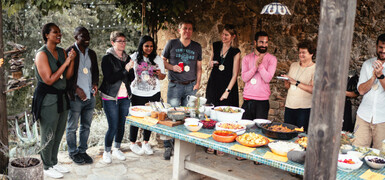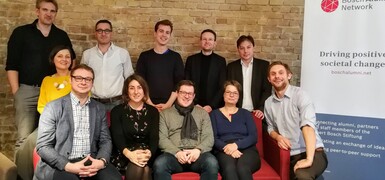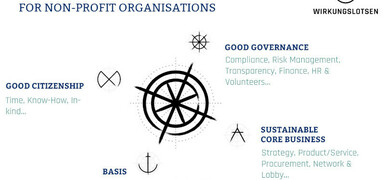
How can nonprofits and civil society organizations overcome the challenges to becoming sustainable?
A shared journey towards sustainability - Interview with Dennis Hoenig-Ohnsorg
Sustainability can be difficult for any organization. However, civil society and nonprofit organizations face additional challenges, ranging from restrictive fiscal policies to not being allowed to offset carbon emissions. To support these organizations as they strive to become more sustainable, iac Berlin organized a sustainability series for nonprofits, consisting of three workshops held in 2020-2021 to co-create strategies, tools, and shared knowledge. Moderator Dennis Hoenig-Ohnsorg walks us through the concept and benefits.
The workshop series was intended to familiarize participants from the nonprofit sector with the topic of sustainability in their organization. What exactly did you want to achieve?
Dennis: Being truly sustainable as an organization is challenging in itself. But it becomes even more difficult when you can't invest your profits in sustainability because you're not legally allowed to do so; when you have few employees and more volunteers; or when you're working with grants that explicitly prohibit you from, e.g., offsetting carbon emissions.
There are so many reasons that make it hard for nonprofits to seriously address the issue. On top of that, there are very few helpful resources available, like toolkits, consulting, or literature.
Why is there such a vacuum especially in the area of nonprofits?
Dennis: In the nonprofit sector, it is often the donors who decide how money is spent. Unfortunately, sustainability has not played a major role up until now. Strict fiscal policies were considered a good way to manage funds and everything should be kept as cheap as possible. Organizations, therefore, had a much harder time working on any kind of sustainability issues at all. They also do not have the reporting obligations—such as carbon emissions, supply chain transparency—that large companies do. Until recently, the only act of responsibility they were supposed to fulfill, was to meet the requirements to keep their nonprofit status.
But more and more donors are increasing the leeway given to organizations in how they use their funds. Slowly, nonprofit organizations are allowed to consider not only price, but other criteria as well, such as regionality and sustainability. Now, even some government funds are allowing carbon offsetting for air travel.
At the same time, people’s expectations are changing. Just working for something socially-oriented is no longer enough for many people. Often, it’s the employees themselves who are driving this development as they demand improvements with regards to sustainability.
It’s pretty hard to understand why organizations in particular, which are trying to solve social problems, should face so many challenges to becoming sustainable themselves.
How far along the path to sustainability were the organizations that participated in the Nachhaltigkeitswerkstatt?
Dennis: I usually look at three core areas in the organizations that I work with: How the core business is organized; how the organization is managed; and in what areas do organizations assume social responsibility. Within the Nachhaltigkeitswerkstatt series, the represented organizations had already made substantial efforts, but in very different ways. One organization had already trained dozens of colleagues as internal sustainability ambassadors. Others had developed professional codes of conduct but had not yet done much in the area of environmentalism. These diverse experiences made for three exciting workshops with many different ideas and perspectives. The exchange between participants, in particular, proved to be very helpful for everybody.
The "sustainability compass" was a central concept of the workshop. What exactly is that?
Dennis: With the compass, we wanted to provide orientation for the people who are driving the issue internally. Many have a lot of enthusiasm for the topic, but don't know how to distinguish between what’s urgent, important, effective, and possible. In the workshop, we tried to make room for both the quick-wins and the long-term strategic goals. The compass helped us to distinguish between the two.
What were the most important learnings for the participants?
Dennis: A central revelation was that sustainability is more than environmental protection. Also, the participants came to realize that while there are many additional barriers for nonprofits to strategically engage in this area, it also presents them with opportunities that large corporations are not as well positioned to take advantage of. But probably the most important thing was for them to understand that everyone is asking the same questions, that everyone is on the move, and that there is no competition. We all want to do the "right thing," and it's much easier to do that in exchange with each other than on our own.
In 2022, iac Berlin and Wirkungslotsen will host the next series of Nachhaltigkeitswerkstatt workshops. Once again, non-profit organizations will be invited to work together on the issue of sustainability, build on the lessons learned so far, deepen our shared understanding, and co-develop additional tools and strategies to achieve sustainability in our organizations.
Do you want to be part of the workshop-series starting in April 2022? Or do you want to learn more about the project or the
sustainability compass?
Please get in touch with:
Eva Behringer
eva.behringer@iac-berlin.org
About Dennis Hoenig-Ohnsorg
Dennis was responsible for the topic of sustainability at Zalando and its integration into their core business. He is co-founder and managing director of Wirkungslotsen, an agency for social change and sustainability, and has been supporting social entrepreneurs, charities, NGOs, and companies in the development of sustainable models for impact and business for over ten years.


